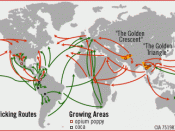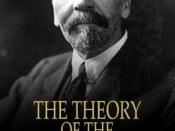"To abstain from the enjoyment which is in our power, or to seek distant rather than immediate results, are among the most painful exertions of the human will" (Senior 1836:60). Divulgence for recordation of leisure necessitates overlooking stereotypes to ultimately develop new faculties of thought and analytical tools in attempt to maximize social benefits while minimizing undesirable social costs. Without thought, it is easy to justify drugs are cheaper for rich people because rich people have a larger supply for capital, thus making it easier for the rich to consume illegal drugs. In order to prove the preceding assumption untrue, one must economically and empirically evaluate the current implications and interpretations of leisure, drug prevalence, demand of euphoria, and shadow prices with the incorporation of the popular theories of addiction to demonstrate illegal drugs are in fact cheaper for poorer people than for rich people.
To understand drug consumptionÃÂs benefits and costs, one must first assume most recreational and habitual illegal drug consumption occurs in ones leisure time as a source of entertainment.
Tibor Scitovsky helps define entertainment and leisure in his article ÃÂThe Desire for Excitement in Modern Society.ÃÂ He first defines entertainment as ÃÂthe sensation due to the increasing arousal of the nervous system that accompanies the process of being stimulated when the stimulus is fairly strongÃÂstrong enough to pose a challenge or threat and so demand oneÃÂs active responseÃÂ (Scitovsky 128). The assumption drug usage is a source of entertainment, however, is only a sufficient condition of entertainment because oneÃÂs utility can be satisfied though many aspects of oneÃÂs life without drugs: education, employment, family, friends etc. Moreover, Scitovsky assumes the optimal level of entertainment is the midpoint between undesirable boredom and overwhelming excitement (Scitovsky 128).
Accordingly, Scitovsky has assumed leisure time has economically evolved into a...


